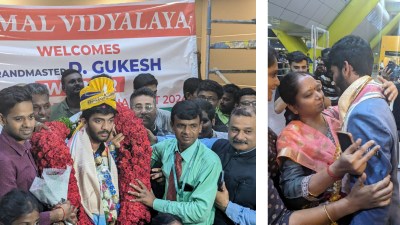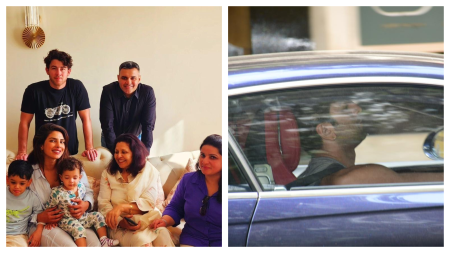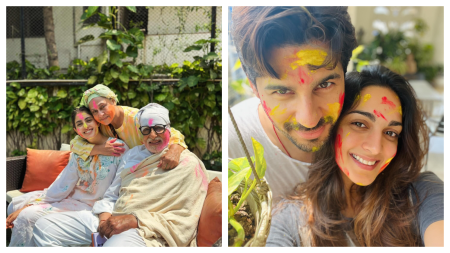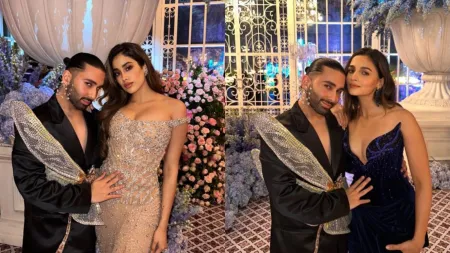- India
- International
Rani Mukerji on being a Mardaani in the world of cinema
Rani Mukerji participated in an interactive session at the at the Screen Big Picture.
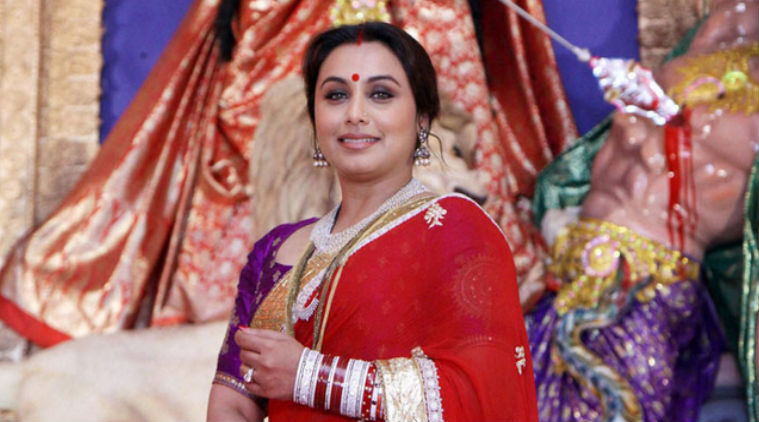 Rani Mukerji: I think Mardaani instilled a lot of courage and inspired women in general.
Rani Mukerji: I think Mardaani instilled a lot of courage and inspired women in general.
SCREEN THE BIG PICTURE
Woman Power
A distinct sigh rose from the crowd gathered to catch a glimpse of Rani Mukerji as
she breezed in for the anniversary edition of Screen The Big Picture. The versatile actress was her candid self and spoke uninhibitedly about what it takes to be a Mardaani in the world of cinema and creating an imprint on the social fabric of the country
 Rani Mukerji
Rani Mukerji
Screen: Rani, you gave a kick-ass performance in Mardaani. But more than heroines in women-centric films, it’s relevant to talk about the role actresses play in society, in this discussion. A lot of your films whether it was Black or Raja Ki Aayegi Baarat stood out for going beyond mindless entertainment. Would you share with us how your recent film Mardaani has affected you as an actor and the society at large?
Rani Mukerji: I am happy that Priyanka (editor Priyanka Sinha Jha) has organised an event where we are talking not only about success in cinema, but also the success of actresses as role models in cinema. Now to answer your question, I think Mardaani is the kind of film that comes once in your career. It was the first time I played a Crime Branch Officer, and when you talk about crime branch, you automatically understand the kind of seriousness that comes with it, because this branch deals with crimes on a ‘every-second’ basis! When I started doing my research, I realised that we are very protected in our city where we only see the beautiful aspects! Only when I met the crime branch officers, I realised that there is a different map of Mumbai — the crime map and how these officers work every day, consistently and fearlessly to protect the civilians. When there’s an untoward incident we say, ‘what was the crime branch or the police doing’? But remember most of the times, they have averted such incidents.
Screen: Are the female officers as spunky as your character in Mardaani?

RM Yes, there is no bias towards women in this profession when it comes to things like doing night duty and dealing with criminals. And whether you are a male or a female cop, you get threat calls everyday from gangsters, murderers and various other people. Luckily, through my film I got to know the world of police officers and crime branch at a close range. I think Mardaani instilled a lot of courage and inspired women in general. It’s about time that women did something to protect their dignity, leave prejudices aside and kindle the spirit to fight back. Throughout the promotion of my film, I kept telling every journalist to inspire parents to send their daughters to self-defense classes. Martial arts is something that should be made compulsory in schools and colleges today, so that women can confidently face the world.
Screen: Your biology teacher who happened to be in Express Towers today, mentioned how you were a mardaani when in school—slapping boys and all that.
RM: Yeah (smiles). I’ve been a mardaani since my childhood. So this role was not new to me. I confess, that I absolutely enjoyed slapping and kicking those that were
disrespectful.
Screen:You’ve turned yourself into a role model, because of the kind of films that you’ve done, some very strong roles which go beyond entertainment.
RM: Yes, girls were just getting out of the theatres and kicking and slapping people! (Laughs)
Screen: You come from a film family, so did you consciously pick roles that go beyond cliches. Was it a deliberate choice, or was it your natural propensity to select strong roles?
RM: No, the funny thing is that my dad is very conservative and was not very happy that I become an actor. According to him men can make, direct, produce and act in films, but women of the house can’t. So, making me an actor was a very big step my mother took. Her sister, Debasree Roy is an actress and my nani had told my mum that if her daughter grew up to be good looking, then she must make her an actress.
My mother had to fight with the entire family to make that happen. My dad made her promise that from the first day of shooting till the time I got married, she had to be present at every shoot. So there was no shooting that I went for without her.
Screen: Rani, we are very curious to know how you signed your first film?
RM: I remember during that time my family was going through a financial crisis. Salim uncle, who is a family friend offered me a film. I was in the 10th standard when he told my mom that I should do Aa Gale Lag Jaa with Jugal Hansraj. I remember, when he offered me the role, I started crying because I did not want to do it.
Screen: But why did you cry?
RM: I was studying in a Juhu school and was inclined towards academics. Besides, at that point of time, the notion among my school friends and me was that the industry was not a good place to be in. But when I was in the 12th class, Salim uncle once again offered me Raja Ki Aayegi Baarat. This time my mother suggested that I should do it and if I didn’t like it, I could always do something else. When I finally did my first film and effortlessly gave my first shot, I found it all so simple!
Screen: And what was your first shot?
RM: My first shot required me to rant and rave against my husband, played by Shadaab Khan. I didn’t understand what I was saying, but I remember I found it interesting. It was such a strange turnaround for me and after that I didn’t have to look back. Then Mukeshji (Mukesh Bhatt) offered me Ghulam opposite Aamir Khan! Aamir was one of my favourite actors at that time and I had a huge crush on him after I saw Qayamat Se Qayamet Tak. So, I was like ‘Oh my god, Aamir Khan’!
Screen: Did you sign the film because Aamir was in it?
RM: No! I was a newcomer and didn’t have that choice. If I had got an offer with another actor, I would have done it too. But the fact that Aamir was impressed by my film promos and recommended me to Mukeshji was a big deal. At the same time Karan (Johar) came to me with Kuch Kuch Hota Hai saying that Shah Rukh had liked my work and wanted to work with me. For me, that was again a dramatic turnaround in my life as I got to work with two great actors. Even today, I look back and say if it hadn’t been for Aamir and Shah Rukh, I would not have been the actor that I am. They taught me that if I had to be successful in my career I should not take a single minute or a single second in my work for granted. That you have to keep working hard, and whether you are a superstar or a success or even a failure, your work ethic has to be the same.
Even today they are probably my closest friends and I still keep learning from them.
Screen: Who has been the biggest influence in your life and career?
RM: My mother has been a very big and strong influence in my life. We Bengalis are the descendants of Shakti and respect strong women. So, whenever a script comes to me the first thing that I make a note of is whether my character is strong. And if she is a modern Indian woman what shades the character has. I think my decisions are very natural.
Screen: Do you give suggestions to the director about playing a character in a particular way?
RM: When we become a part of a project, it becomes a team work and as an actor you try to see what you can do to improve the character. Sometimes you read a script and you are like, ‘Wow, what a role’! And then, there are some roles which are great, but you still want to give your inputs from a woman’s perspective. And since my directors feel that I am a ‘thinking’ actor, they like to take my opinion as they feel that it might make the script better.
Screen: Any particular film that you would like to mention as the one that has turned your career around?
RM: I think the change happened during Saathiya because before that film, acting for me was just a way to earn my bread and butter. I wasn’t really enamoured by the love of cinema or my craft. It was more about ‘mom has signed this film for me, so ok, we go and shoot’. And I followed what my director told me.
There was no Twitter at that time, but I got a lot of fan mail. I used to read most of the letters and I realised that my fans wanted to see me in more substantial roles. For most films, I would shoot for 20 days and would move on to the next. I was doing seven films a year then. But, after doing Saathiya, I thought I could enjoy being part of a film shoot for a longer span. I enjoyed reading scripts, understanding my role and how I could play it. I decided to do one or two films a year and started enjoying the process. So, I have to give credit to Saathiya for initiating that change within me.
Screen: Rani, you have very real people as reference points, which is refreshing in actors as they tend to get a little removed from reality. You once mentioned that when you were speaking to your maid and she was talking about Salman Khan.
RM: Yes, because I had asked her “film kaisi lagi?” and she said that they watch a film, to see Salman Khan— how he fights, dances, opens his shirt etc. And that’s paisa vasool for them. So I think that’s what Salman’s success is; people don’t care about what he does, they just want to see him.
Screen: As actors, getting carried away by all the publicity is easy. How do you manage to remain grounded?
RM: As I already mentioned, I didn’t want to be an actress. When I look back at my life I just realise that God has been really kind and I’ve achieved a lot. When you do a good film people remember you and when you do a bad film people immediately forget all the good work you have done. I’ve seen a lot of ups and downs and I know it doesn’t matter what the result is on Friday. If you have done commendable work then the audience will always remember you. Today, I have a Mardaani that people have loved, so this Friday they’ll be really excited about me, but I don’t know what’s going to happen with the next film I do.
I think our life as an actor is largely dominated by the Fridays. If you give a film which is successful, people label you as the ‘face of today’, and aren’t looking at you just because of your craft. There are very few people who’ve achieved beyond the crores that your films make. There is space for all kinds of cinema today, but to be honest, the main focus today is about how financially successful your film is. Whether you are an actor, actress, a director or producer, you are gauged according to your box-office success. Earlier, for a film to celebrate its success party, it took 25 weeks for it to become a silver jubilee and 50 weeks to become a golden jubilee. Today we have success parties being hosted in three days! That’s how much the multiplexes have changed the whole scenario. In three days a newcomer can become the biggest actor in the industry and in three days a top actor can become a zero!
Screen: You just mentioned that the industry is driven by commerce. In that kind of scenario when you want the endorsement tag of being a commercially viable star, how do you choose the right path of being the correct role-model for so many people who look up to you?
RM: I don’t think I consciously chose a right path. As an actor I react very emotionally and instinctively when I read a script. If I had to judge whether a film is commercial or non-commercial, then I probably wouldn’t have done half the roles I did. I think what I rely on is whether it will be a film I will enjoy watching, or a role that I would want to see another actress play. There is no trade pundit that can say that if you do this film you’ll earn `100 crore or if you do this film you’ll get a National Award. I think we all rely on our instincts and some people’s instincts are stronger and work in their favour. Right from the beginning of my career, I managed to create a space for myself with whatever decisions I have taken. I have realised that it’s a huge responsibility, and that people love me beyond my films.
Screen: So you go with your instincts and something in which you believe in.
RM: Yes, and also something that I love.
One has to work with sincerity and dedication. There will be times when you will feel very low. Sometimes when you are working on a scene you might feel that you aren’t getting it right.
That’s the time when you can show your courage and strength. When I joined the industry, my dad told me a very simple thing, that I follow till date. Don’t get over-excited with success and don’t get over-disillusioned with failure, because both are going to be part of your journey as an actor. The day you take success seriously you’ll start flying, and with failure you can actually find yourself in a deep dungeon which can take the oxygen out of your lungs. It’s important to keep a balance and to keep your dignity intact with the roles. Also we should not allow our decisions to be influenced by anyone.
Actually the field is so competitive today that when you’re making your debut, you have 10 people taking care of you.
A stylist, hair-dresser, a PR, etc who gives advice. When we started off, we made our mistakes and we learnt from them. Today, people are extremely impatient and not willing to give newcomers a chance to make mistakes. Everybody is so prim and proper in their first film as they cannot afford to make a mistake. Today, people are extremely impatient with newcomers. That also comes with the fact that there is so much of money at stake. But when you work with seasoned actors and directors, you learn from them, and if you want to create an identity of your own, then you should be like clay. You have to let the specialists like hairstylists, cinematographers work on you because that’s when you will see results and, you will see how different you are in every film.
Screen: Rani, when we watch your films in which you tackle social issues, but the film industry itself has its own problems like gender bias, unequal pay, lack of professionalism etc. Why does no leading actor talk about such issues in their films. It’s all so hush hush.
RM: Exploitation is present when you want to be exploited. Nobody is putting a gun to your head and making you do something. Unfortunately, our audience, will go to watch a Salman film, but if there is an actress playing the lead in a film, they will wait for the critics’ review and then decide whether they want to watch it or not. This bias is there because the financially successful films are male dominated. When a hero centric film releases, it makes Rs.30 crore on the first day, while a woman dominated film will earn that much in two weeks. At one point Sridevi used to charge more than her heroes because her films used to run to packed houses.
All the women-centric films did well because of word-of-mouth publicity. The box-office success which the male actors can bring is still unparalleled. However much we may talk about equality, that men and women are equal, they are not. This discrepancy exists not because we don’t want them to be equal, but because the audience is not yet ready for it.
Mardaani is like a trendsetter. Hopefully, the audience will come to see more such women-centric films.
Guru speaks
‘Take advice from all, but keep your own counsel’, is what Rani Mukerji had to tell
Urvashi Rautela who has made her debut in Singh Saab The Great, when the latter asked her for tips to survive in the industry
Obliging fans
Although hard pressed for time, Rani who had to attend another event, took time
out for her fans and posed with them. In fact, several college kids even trailed behind her to the Screen office for a photograph with their favourite actress
Ethnic look
Keeping the festive season in mind, and the fact that our event coincided with the first day of Navratri, Rani Mukerji looked radiant in a deep blue sari and a bunch of silver bangles adorning her wrists.
CLASS APART
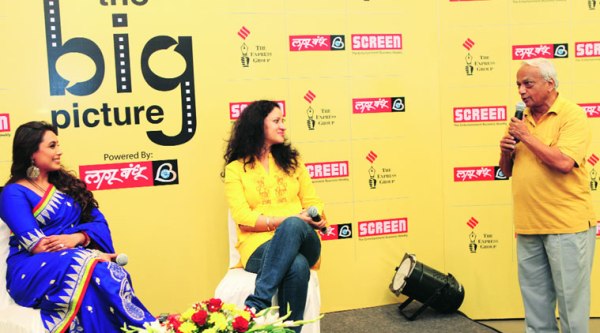 Rani’s biology teacher saying a few words
Rani’s biology teacher saying a few words
It was a pleasant coincidence indeed for Rani, who bumped into her biology teacher in the lobby.Later, he even attended the session where he reminisced about his student’s behaviour stating that, “what you have seen her in Mardaani, she was the same in school, espousing equality and fierecely independent.” He also went on to say that when her first film Raja Ki Aayegi Baraat released, both she and co-star Shadaab Khan who also happens to be his student, invited several teachers for the premiere. Rani, too mentioned that most students including her loved the subject because of him. “He would come to the class and say,”Open the windows and let the climate come in.”
Transcribed by Karan Shah
Edited by Geety Sahgal, Namita Nivas and Farida Khanzada
All photos by Prakash Yeram and Pradip Das
Photos
Apr 25: Latest News
- 01
- 02
- 03
- 04
- 05











